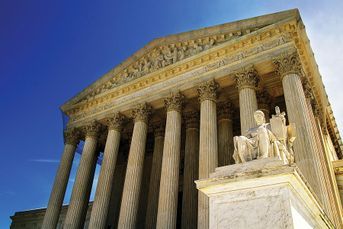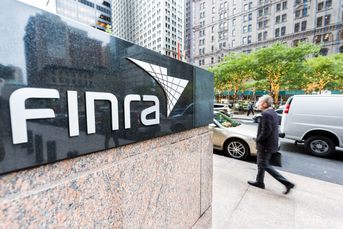Barr wades in to join battle to cripple Finra

Former Trump Attorney General enters fight with other heavyweights on behalf of broker-dealer against Biden’s Justice Department.
The Financial Industry Regulatory Authority Inc. is confronting a potential existential challenge in a federal appeals court in Washington, D.C.
Judges presiding over the case have raised serious constitutional concerns regarding Finra’s authority to enforce securities regulations.
To add to the pressure on Finra, William Barr, the former Attorney General under the Trump administration, and Noel Francisco, the former U.S. Solicitor General, have entered the fray, advocating for significant changes to Finra’s role and authority, according to a report by Reuters.
In a friend-of-the-court brief submitted Wednesday, Barr and Francisco presented their arguments, aligning themselves against the stance of the Biden administration’s Justice Department, which supports the current structure of Finra.
The broker-dealer at the center of the battle, Salt Lake City based Alpine Securities Corp, is contending that the Constitution’s appointments and removal requirements apply only to agencies and instrumentalities of the United States, not to a private party — such as Finra.
This clash between the Justice Department and two former high-ranking officials underscores the far-reaching implications of the ongoing Finra appeal.
The genesis of this case traces back to broker-dealer Alpine Securities Corp’s efforts to halt an expedited Finra hearing that aimed to boot Alpine from the organization and require it to pay $2.3 million in what it claims are overpaid fees. “Individually, the violations in this case are amongst the most egregious in the securities industry” Finra said at the time.
The Justice Department referred to Alpine as “a broker-dealer with a recidivist disciplinary history that has violated Finra’s rules thousands of times over the past year”.
Alpine launched a lawsuit seeking to enjoin the Finra hearing, attacking Finra’s constitutional structure. Although Alpine advanced additional constitutional arguments like due process and First Amendment defenses, these aspects are not currently under consideration by the D.C. Circuit.
Alpine’s first contention is that Finra hearing officers, wielding substantial power to enforce federal securities laws, effectively act as government agents. However, they are purportedly private employees, exempt from presidential oversight. Alpine asserts that this framework violates the Appointments Clause, as the president has no role in selecting Finra officers, and other provisions in Article II of the Constitution, as Finra officers remain immune to presidential removal.
Alternatively, Alpine argues that if Finra is not considered a government entity, its enforcement of federal securities laws infringes upon the constitutional nondelegation doctrine, stipulating that federal authority should be wielded solely by the federal government. Alpine concedes that private entities can assist in enforcing federal law, but contends that the SEC’s oversight of Finra is insufficient to meet constitutional standards.
U.S. District Judge Beryl Howell, in a ruling issued in June, dismissed all of Alpine’s arguments. Howell determined that Finra does not qualify as a state actor, citing extensive legal precedent affirming its status as a private self-regulatory organization. She also asserted that the nondelegation doctrine does not apply, emphasizing the SEC’s ultimate control and oversight over Finra, including the power to reject Finra’s enforcement decisions.
Alpine subsequently turned to the D.C. Circuit, seeking an emergency injunction to halt Finra’s expedited proceedings.
Both Finra, represented by Gibson Dunn & Crutcher, and the Justice Department urged the circuit court judges to deny the injunction. The Justice Department, which intervened in the case to defend Finra, argued that Alpine’s contentions contradict the SEC’s oversight of Finra.
The Justice Department stated, “Finra is a private, self-regulatory organization whose front-line supervision of its own members is subject to plenary SEC oversight and review. It is thus not a state actor.”
In a surprising turn of events, a divided three-judge D.C. Circuit panel granted Alpine’s motion in July. In a concurring opinion, Judge Justin Walker, appointed to the appeals court in 2020, suggested that Finra hearing officers appear to exercise authority similar to SEC administrative law judges. According to recent U.S. Supreme Court precedent, such judges are subject to the Appointments Clause.
Walker wrote, “That may be a constitutional problem. There is a serious argument that Finra hearing officers exercise significant executive power. And it is undisputed that they do not act under the President.”
In response, Finra implored the entire D.C. Circuit to reconsider the panel’s decision, cautioning that the injunction “threatens to upend” Finra’s enforcement efforts. Over several decades, Finra argued, other appellate courts have consistently rejected challenges to its role, recognizing the organization as a congressionally authorized private self-regulator operating under the SEC’s ultimate control.
Last month, the appeals court denied Finra’s motion, allowing Alpine to submit its opening brief on the merits last week.
This development prompted two additional briefs in support of Alpine, one from the New Civil Liberties Alliance, a nonprofit frequently representing defendants facing SEC actions, and another from Barr, now at Torridon Law, and Francisco, a partner at Jones Day. They filed on behalf of the American Free Enterprise Chamber of Commerce, a recently established group committed to countering what it views as the excessive expansion of the federal regulatory state, which it believes is stifling American businesses.
“Finra investigates, prosecutes, and punishes hundreds of securities brokers and firms each year based on alleged violations of federal securities laws and rules, imposing tens of millions of dollars in aggregate fines, yet the SEC reviews only a tiny handful of those cases, and even then only years later, after all the constitutional damage is already done and irremediable” the NCLA said. “The Constitution wisely forbids this kind of unchecked private law enforcement activity.”
Barr and Francisco presented arguments mirroring Alpine’s position, contending that Finra hearing officers qualify as state actors who are unconstitutionally appointed and shielded from removal. Alternatively, they argue that Finra is unconstitutionally exercising executive-branch power without adequate government oversight.
“The Constitution cannot tolerate such an arrangement,” Barr and Francisco asserted in their brief.
Learn more about reprints and licensing for this article.








